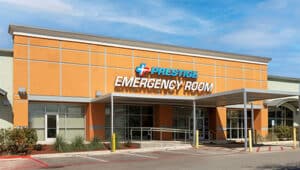Pediatric ER Fever Treatment in San Antonio
Almost every parent has experienced a child waking up in the middle of the night with a fever. They may be irritable, confused, uncomfortable, or crying. Do they need Tylenol or a trip to the emergency room? As a parent, you may be worried and uncertain. It’s understandable–you want what’s best for your child.
At Prestige ER, we understand and want you to know when to get medical care.
A fever is your child’s natural response as their bodies fight off germs. Sometimes, however, a fever calls for medical attention. Our caring providers are equipped to diagnose and treat pediatric fevers and give you peace of mind.
When to Take a Child to the ER for a Fever
It’s essential to know how to check your child for a fever.
There are a variety of thermometers available, and each is slightly different.
Generally speaking, your child has a fever if:
- Oral thermometer: A fever is 100°F (37.8°C) or higher.
- Armpit thermometer: A fever is 99°F (37.2°C) or higher, but this method is less accurate.
- Ear, forehead, or rectal thermometer: A fever is 100.4°F (38°C) or higher.
For babies: Use a rectal thermometer for the most accurate reading.
Remember: These are general guidelines. If your child seems unwell, consult a doctor regardless of temperature.
You should take your child to an emergency room for pediatric fever treatment if:
- Your child has a fever after being in a hot car or outside in hot weather. This may indicate heat stroke.
- Your child has a stiff neck that is resistive to gentle efforts to move it.
- Your child’s eyes are sensitive to light.
- Your child is experiencing a severe headache.
- Your child has abdominal pain or tenderness.
- Your child is unusually sleepy, lethargic, or confused.
- Your child has a rash.
- Your child is having difficulty breathing.
- Your child has had a seizure. Febrile seizures are typical for some young children and often do not indicate an underlying problem. However, a provider can help make this determination while ensuring your child is safe and in stable condition.
In other cases, determining whether your child needs to see a doctor for their fever can be unclear for many parents. Whether to seek medical care depends partly on your child’s age and temperature.
When to Take a Baby to the ER for a Fever
- Younger than 3 months: Seek medical care for a rectal temperature higher than 100.4°F.
- From 3 to 6 months: See a provider for a rectal temperature higher than 102°F or if your child is lethargic or irritable.
- From 7 to 24 months: See a doctor for a temperature higher than 102°F that lasts for more than a day. You may visit sooner if other symptoms, such as a cough, congestion, vomiting, sore throat, or diarrhea accompany the fever.
- If your infant or toddler isn’t taking in fluids, is lethargic, or is urinating only small amounts, you should see a doctor.
When is a Fever Too High for a Child?
For an older child, a temperature of 102°F or less is likely not concerning if they interact normally. This may include talking, playing, and drinking fluids. A fever is often the body’s normal response to illness. You should seek pediatric fever treatment for the following:
- Your child’s fever does not respond to over-the-counter medicines like ibuprofen (Motrin) or acetaminophen (Tylenol).
- Your child’s fever lasts more than a few days.
- Your child has other symptoms, such as vomiting, a sore throat, or diarrhea.
Sometimes, a parent’s simple intuition is a valuable tool. If you are uncomfortable about your child’s condition, seek medical help.
Symptoms of a Fever
A fever in children can be associated with other symptoms, including:
- Headache.
- Muscle aches.
- Sweating.
- Chills.
- Weakness.
- Fatigue.
- Lethargy.
- Loss of appetite.
- Dehydration.
Pediatric Fever Treatment in the ER
At Prestige ER, our caring staff ensures you and your child are seen promptly. Your provider will discuss your child’s symptoms and any pertinent health history. They will check critical vital signs, perform a physical exam, and order any tests that may help reach a diagnosis.
Possible tests may include nasal or throat swabs, blood tests, or diagnostic imaging. Each location offers a full spectrum of medical equipment and services, including an on-site lab.
Your provider will ensure your child gets the care and treatment they need.
If your child requires hospital admission for more extensive care, we can promptly transfer you and your child with our private ambulance service.
Helping Your Child Recover from a Fever
You can do several things for your child as they recover from a fever:
- Ensure they drink fluids. Your child needs to stay hydrated when they are sick. This is especially true if they are running a temperature that may increase fluid loss through sweat. Appropriate fluids include water, milk, soup, and broth. Juice and sports drinks may be helpful in moderation, but they may cause stomach upset.
- Keep them cool. Covering your child in a light sheet only and dabbing their forehead with a cool washcloth can keep them comfortable and may reduce their temperature.
- Help them rest. Ensure your child gets the rest they need as their body fights off their illness and heals.
Prestige ER is a trusted home for pediatric care in San Antonio. We provide a full spectrum of emergency treatment for pediatric fever and many other conditions without the long wait times of a hospital-based ER. Find a location near you.












